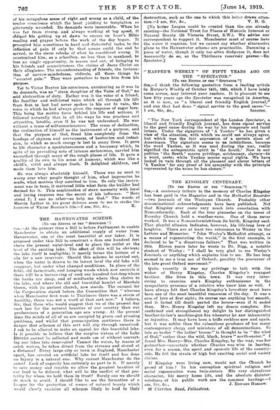THE HAWESWATER SCHEME.
tTo THE EDITOR Or THE " SPECTATOR.") SIE,-At the present time a Bill is before Parliament to enable Manchester to obtain an additional supply of water from Haweswater, one of the most beautiful of our lakes. It is proposed under this Bill to construct a dam one hundred feet above the present water-level and to place the outlet at the level of the existing lake. The effect of this will be obvious; the lake itself is negligible; it merely forms the bottom of a site for a new reservoir. Should this scheme be carried out, when the water is drawn to its lowest level the old lake will reappear, but antler what changed conditions. In place of the fields, old farmsteads, and hanging woods which now encircle it there will be a barren ring of rock one hundred feet deep where the banks are steep, and of mndbanks where they shelve to the lake, and where the old and beautiful hamlet of Mardale Green, with its ancient church, now stands. The counsel for the Corporation stated before the Committee that " whereas when Manchester first went to Thirlmere there was a storm of hostility, there was not a word of that sort now." I believe, Sir, that those who would suggest that we of the present day care less for the natural beauties of our country than our predecessors of a generation ago are wrong.. At the present time the minds of all of us are occupied by grave and pressing problems, and whilst that preoccupation continues there is danger that schemes of this sort will slip through unnoticed. I ask to be allowed to make an appeal for this beautiful lake. Is it possible to believe that the surplus waters of the Lake District cannot be collected and made use of without convert- ing our lakes into reservoirs? Cannot the water, by means of catch waters, be taken direct from the streams and stored at a distance? Every large city or town in England. Manchester apart, has created an artificial lake for itself and has done no injury to a natural one. Why cannot Manchester do the borne? Lack of capacity has certainly no part in it. If merely to save money and trouble we allow the greatest beauties of our land to be defaced, what will be the verdict of that pos- terity for whom we hold them in trust? Surely one we should do much to avoid. I should like to see the formation of a League for the protection of scenes of natural beauty which would closely examine all schemes likely to lead to their
destruction, such as the one to which this letter draws tittles- [No better League could be created than the one already existing—the National Trust for Places of Historic Interest or Natural Beauty (25 Victoria Street, •S.W.). We advise our correspondent to support it. Manchester must of course have the water it requires, but we cannot say whether alternative plans to the Haweswater schema are practicable. Damming a piece of water, though it only too often disfigures it, does not necessarily do so, as the Thirlmere reservoir proves.—En. Spectator.]


































 Previous page
Previous page